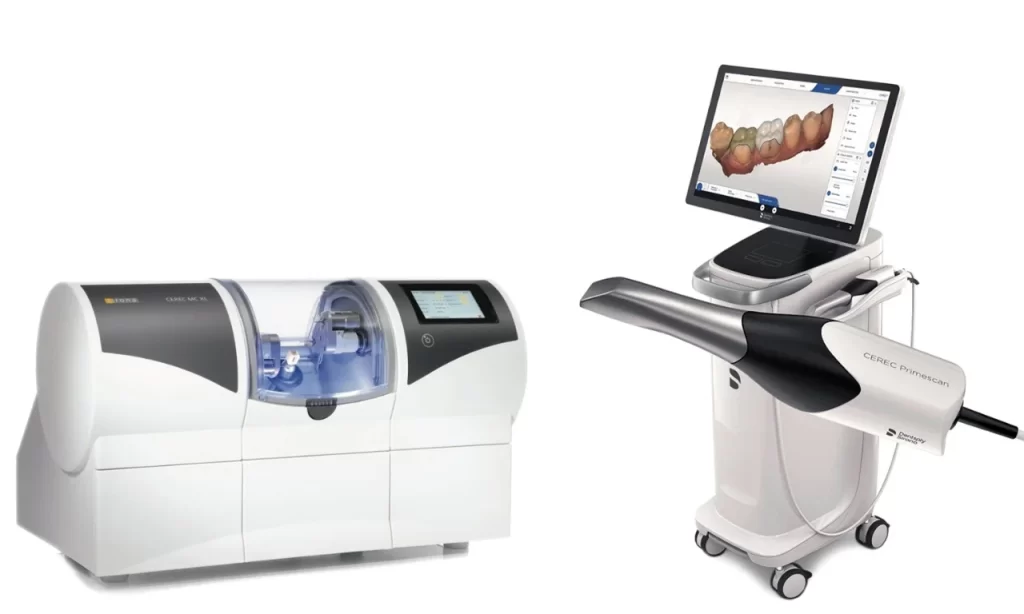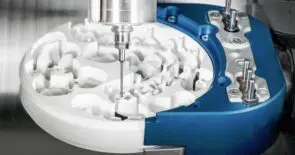Metal-free Ceramics for Dental Prosthetics
Quality guarantee for zirconium crowns

How long do all-ceramic crowns last? Stronger types, such as zirconia, last about 10-15 years on average, although they can last 20 years or more with proper dental care and use. More fragile types, such as porcelain crowns, break sooner and only last 5-10 years. Studies have shown that the survival rate of ceramic-based crowns is similar to that of metal crowns.
Specifics of prosthetics of anterior teeth

Anterior crowns require special attention for aesthetic reasons. This is because they are located at the front of the mouth and therefore can be seen when the patient smiles, eats or speaks. For this reason, the preparation of a zirconia crown in the anterior part of the mouth requires special attention to the following elements:
- Clearance – Clearance is very important when preparing an anterior zirconia crown. You will need to leave at least 0.3mm of space to accommodate the thickness of the crown wall. Additionally, you will need to allow for an incisal reduction of 1mm to 1.5mm or 1.8mm to 2.0mm.
- Circumferential Chamfer – The circumferential chamfer should be visible and continuous. At the gingival margin, you will need a minimum of 0.5mm of reduction.
Also, proper preparation of a zirconia crown for anterior crowns involves preparing the tooth structure at an angle of approximately 5° without chamfering. Remember to round off each incisal edge. You can use a football diamond to reduce the side of the crown facing the tongue so that it is slightly concave.
Zirconium dioxide crowns before and after photos


Proper care

Oral Hygiene: Maintaining good oral hygiene is crucial for those who want to extend the life of their dental crown. If a patient does not maintain good hygiene habits, the gums will deteriorate, causing the crown to break. Brushing and flossing at least twice a day can extend the life of zirconia crowns. Avoid Hard Foods: Once your dentist has placed a crown, it is very important to avoid eating anything very hard that could cause damage to the teeth. Hard sweets, ice cubes, sticky foods, and nuts can potentially break the crown and the underlying tooth. Patients also need to avoid bad habits such as chewing their nails and opening bottles and packages with their teeth. Regular Dental Checkups: Patients should schedule a cleaning and checkup with their dentist every six months. These appointments help the dentist monitor the patient’s oral health and recommend appropriate treatment if anything is wrong. They may also recommend dental x-rays to check the health of the smile.
Cost in Turkey and features

Every year, thousands of foreign patients come to Turkey to get dental crowns. They are used for both aesthetic and therapeutic reasons. If you decide to get dental crowns in Turkey, you need to know why the prices are so affordable and why you should trust a Turkish clinic and its expertise in dental restoration. You are also probably wondering about dental insurance and whether they are accepted in Turkey, and how much a week or so will cost if you stay in Turkey or Istanbul. But why should you get zirconium dental crowns in Turkey? Here are some reasons why we offer top-notch dentistry:
- Low Prices: You will be able to get premium dental treatment at an affordable price thanks to the convenient currency exchange of Euro, Dollar or Pound compared to Turkish Lira. You do not have to worry about this affecting the quality of treatment, structure or doctor.
- Qualified Dentists: Firstly, it is very important to trust your health in the hands of qualified and experienced dentists. With a large number of prestigious universities in Turkey and the number of patients coming for dental treatments every month, you can be sure that your dentist will be experienced and trustworthy.
- No Long Waiting Lists: Your time is precious and waiting lists can be very annoying. In the private healthcare sector, you can be sure that you will not have to wait long to get a healthy smile! No waiting period for you.
- Impressive Clinics: Choosing a private clinic will allow you to get the most modern, prestigious, clean and high-tech clinic that Turkey has to offer.
- Vacation Time: You won’t be spending all your time in the clinic, so why not enjoy a fantastic holiday in Turkey and enjoy its many wonders?
- All-inclusive services: We take care of everything for you, including transportation, hotel and treatment. We create a detailed treatment plan so you can just show up and enjoy your dental treatment and vacation!
- The best materials: It doesn’t matter what type of material you want: E-Max crowns, porcelain, ceramic, disilicate ceramic crowns, etc. You will always have the highest quality materials.
Custom zirconium crowns usually take between 4 and 7 days to make. This means that you will need to stay in Turkey for about a week. If you are wondering, “How much do dental crowns cost in Turkey?”, you should know that you are not alone. People want to avoid sky-high running costs. That is why this is probably the first question people ask when considering dental crowns in Turkey. As we have explained, the cost of a dental crown in Turkey is significantly lower compared to the United States, the United Kingdom or Europe. This is a big advantage for foreigners who choose medical tourism and a dental clinic in Turkey.
But how do you compare prices? Let’s take a look right here:
Zirconium crown in Turkey price range 130$ – 250$
Zirconium crown in the UK price range £ 650 — £ 1000
Zirconium crown in Europe price range € 550 – € 900
Zirconium crown in America price range 600$ – 3000$
Medical tourism in Turkey allows a large number of people to come to Turkey, and in particular to Istanbul, to get their teeth done and their smiles changed. This helps keep the market profitable, accessible, with low and competitive prices. It also helps give doctors a huge experience and exposure to a variety of different patients, needs, cases and requests. In addition, it is possible to obtain and produce top quality dental materials at a fraction of the cost. Also, the government has noticed how profitable medical tourism is and how beneficial it is for the country. So, the Turkish government helps the private healthcare sector with incentives, low taxes and other benefits. This has a strong impact on prices, especially when it comes to low taxes.

Metal-free ceramic crowns

The most common reasons for placing a crown are to maintain the integrity of the tooth structure, although crowns can also be used for cosmetic improvement.
You may need a crown if your tooth is:
- broken or cracked from a blow
- decayed or severely discolored from poor oral hygiene
- weak from wear and tear from damage or excavation from root canal treatment
- misshapen or unattractive from severe discoloration
- large portions are missing or missing from extraction
- worn at the points and no longer sharp
- changed by a large filling or dental implant
The best way to know if you need a crown is to have your teeth examined by a dentist. Only a professional can assess their condition and determine the right treatment.
Types of metal-free ceramics

When it comes to dental crowns, you basically have three categories: metal, non-metal, and alloy. The main difference between metal-free crowns and metal crowns is the material they contain, whether it is a natural metal, a metal alloy, or another substance. What are metal-free crowns made of? They are most often made of porcelain, quartz, glass, or resin-based ceramics, with zirconium disilicate and lithium disilicate becoming increasingly popular.
All-resin crowns:
This common, inexpensive type of crown is made of composite resin. It is easy to shape, but it is also easily damaged, so it is sometimes used as a temporary crown. Average cost is $300-$1,000.
Ceramic crowns:
These metal-free crowns use porcelain or ceramic. They have a natural appearance that blends perfectly with the rest of the teeth, so they are often used to make crowns for front teeth. The average cost is $800-$2,500.
Metal-ceramic crowns:
PFM crowns look like porcelain but contain metal for strength. This also makes them cheaper. The average cost is $500-$2,000.
Lithium disilicate crowns:
This highly durable glass ceramic is made from components such as quartz and is resistant to thermal shock. It is strong enough to be bonded to front or back teeth, and has become increasingly popular over the past decade. Average cost is $1,000-$3,000
Zirconium crowns:
An innovative type of crown made from zirconium oxide, which is stronger and more natural looking than regular porcelain. This means that zirconium crowns are metal-free, non-toxic, and have been shown to withstand the most pressure of any non-metal crown. Average cost: $1,000-$3,000 The cost of a non-metal crown varies depending on its materials, availability, and how much time and effort is required to prepare and place it. Most non-metal crowns are more expensive than metal crowns, although some metal crowns are more expensive than plastic crowns.
The main advantages of metal-free ceramics

What are the advantages of metal-free crowns? They are better because:
- They are less susceptible to cold and heat, so they are less likely to cause sensitivity
- There are no allergic reactions to metals.
- They are installed faster and easier than metal crowns.
- Easily shape your mouth perfectly
- Look more natural, imitating the pearlescent color and shine of real teeth
Advantages of Zirconia Crowns

Zirconia dental material is incredibly durable due to its crystalline structure, is a ceramic construction, and will not have unsightly metal lines like porcelain crowns pressed against metal. The many benefits of choosing zirconia crowns can be divided into several categories:
- Appearance. Zirconia has a translucent crystal appearance. This makes it naturally unnoticeable to the teeth in the back of the mouth. Combined with its durability, zirconia is ideal for molars and chewing teeth. The natural appearance of zirconia will not stand out if it is covered with porcelain, like metal crowns. Zirconia can also be easily reshaped or colored to match your teeth, and is a preferred option for camouflaging stains or damage to teeth.
- Strength. Zirconia can be made from a single monolithic piece. This greatly increases its longevity. Zirconia has the highest fracture strength of almost any dental implant on the market. Anything stronger can cause more potential complications for your mouth. Zirconia at 1mm is stronger than a 1.5mm thick porcelain fused to metal (PFM). The correct thickness, care, and fit will last your zirconia crown for an average of 10-20 years. Zirconia also has good strength and resistance to temperature changes, which should prevent tooth pain or discomfort.
- Durability. On average, your zirconia crown should last 10-20 years without any issues. This doesn’t mean it can’t last 20+ years without any issues. Given the durability, lack of chipping or cracking, and ease of cleaning of the material, you shouldn’t have any issues for many years; if you have any at all.
- Safety. Zirconium is highly biocompatible. There is nothing in the material that could react with your body. This will significantly reduce the likelihood of infections, allergies, or the penetration of harmful metals or chemicals into your body.
Disadvantages of the method

Zirconia dental crowns have many potential drawbacks. Even with new dental enhancements, the appearance of zirconia may not match the shade of the tooth. If a patient is getting a crown on a front tooth, they may want a lithium disilicate or porcelain crown instead. Zirconia crowns are generally one of the most expensive types of crowns.
If you are considering dental services in Turkey, you can receive a free consultation by simply filling out the form below. Our specialists will contact you as soon as possible to answer all your questions and help you make an informed decision.
Manufacturing of crowns using CAD/CAM technology

Until now, the zirconia CAD/CAM system has the highest fracture strength among all-ceramic materials and has consistently provided the most esthetic and realistic reproduction of natural teeth. They have been widely accepted by both dentists and patients. The zirconia CAD/CAM system is designed for crowns and bridges in natural teeth or implants and telescopes, the zirconia CAD/CAM system can be placed anywhere in the oral cavity and can replace porcelain crowns and bridges with single crowns and bridges of less than 6 units.
Features of installation of zirconium crowns
The crown is installed under local anesthesia (if necessary) and the tooth is isolated with a cofferdam. But not in all cases. After this, it is thoroughly cleaned and degreased, and the crown is disinfected. Depending on the situation, the doctor selects cement for fixing the crown, and if necessary, illuminates it for hardening. On average, installing zirconium crowns takes about 10-30 minutes. The undeniable advantage of such prostheses is that they can be fixed at once in a group of 2-3-4 crowns, which significantly saves time, and in the case of zirconium, it is also less traumatic. Important! If you need a long bridge prosthesis (5-6 teeth long), then it is better to prefer metal-ceramic crowns made of titanium or chromium-cobalt alloy. A bridge made of zirconium dioxide may not withstand the load without additional support. Therefore, long bridges are best made with support on a titanium beam. At the same time, a zirconium crown fits very well on a single implant and lasts for many years.
Quality guarantee for zirconium crowns

How long do all-ceramic crowns last? Stronger types, such as zirconia, last about 10-15 years on average, although they can last 20 years or more with proper dental care and use. More fragile types, such as porcelain crowns, break sooner and only last 5-10 years. Studies have shown that the survival rate of ceramic-based crowns is similar to that of metal crowns.
Specifics of prosthetics of anterior teeth

Anterior crowns require special attention for aesthetic reasons. This is because they are located at the front of the mouth and therefore can be seen when the patient smiles, eats or speaks. For this reason, the preparation of a zirconia crown in the anterior part of the mouth requires special attention to the following elements:
- Clearance – Clearance is very important when preparing an anterior zirconia crown. You will need to leave at least 0.3mm of space to accommodate the thickness of the crown wall. Additionally, you will need to allow for an incisal reduction of 1mm to 1.5mm or 1.8mm to 2.0mm.
- Circumferential Chamfer – The circumferential chamfer should be visible and continuous. At the gingival margin, you will need a minimum of 0.5mm of reduction.
Also, proper preparation of a zirconia crown for anterior crowns involves preparing the tooth structure at an angle of approximately 5° without chamfering. Remember to round off each incisal edge. You can use a football diamond to reduce the side of the crown facing the tongue so that it is slightly concave.
Zirconium dioxide crowns before and after photos


Proper care

Oral Hygiene: Maintaining good oral hygiene is crucial for those who want to extend the life of their dental crown. If a patient does not maintain good hygiene habits, the gums will deteriorate, causing the crown to break. Brushing and flossing at least twice a day can extend the life of zirconia crowns. Avoid Hard Foods: Once your dentist has placed a crown, it is very important to avoid eating anything very hard that could cause damage to the teeth. Hard sweets, ice cubes, sticky foods, and nuts can potentially break the crown and the underlying tooth. Patients also need to avoid bad habits such as chewing their nails and opening bottles and packages with their teeth. Regular Dental Checkups: Patients should schedule a cleaning and checkup with their dentist every six months. These appointments help the dentist monitor the patient’s oral health and recommend appropriate treatment if anything is wrong. They may also recommend dental x-rays to check the health of the smile.
Cost in Turkey and features

Every year, thousands of foreign patients come to Turkey to get dental crowns. They are used for both aesthetic and therapeutic reasons. If you decide to get dental crowns in Turkey, you need to know why the prices are so affordable and why you should trust a Turkish clinic and its expertise in dental restoration. You are also probably wondering about dental insurance and whether they are accepted in Turkey, and how much a week or so will cost if you stay in Turkey or Istanbul. But why should you get zirconium dental crowns in Turkey? Here are some reasons why we offer top-notch dentistry:
- Low Prices: You will be able to get premium dental treatment at an affordable price thanks to the convenient currency exchange of Euro, Dollar or Pound compared to Turkish Lira. You do not have to worry about this affecting the quality of treatment, structure or doctor.
- Qualified Dentists: Firstly, it is very important to trust your health in the hands of qualified and experienced dentists. With a large number of prestigious universities in Turkey and the number of patients coming for dental treatments every month, you can be sure that your dentist will be experienced and trustworthy.
- No Long Waiting Lists: Your time is precious and waiting lists can be very annoying. In the private healthcare sector, you can be sure that you will not have to wait long to get a healthy smile! No waiting period for you.
- Impressive Clinics: Choosing a private clinic will allow you to get the most modern, prestigious, clean and high-tech clinic that Turkey has to offer.
- Vacation Time: You won’t be spending all your time in the clinic, so why not enjoy a fantastic holiday in Turkey and enjoy its many wonders?
- All-inclusive services: We take care of everything for you, including transportation, hotel and treatment. We create a detailed treatment plan so you can just show up and enjoy your dental treatment and vacation!
- The best materials: It doesn’t matter what type of material you want: E-Max crowns, porcelain, ceramic, disilicate ceramic crowns, etc. You will always have the highest quality materials.
Custom zirconium crowns usually take between 4 and 7 days to make. This means that you will need to stay in Turkey for about a week. If you are wondering, “How much do dental crowns cost in Turkey?”, you should know that you are not alone. People want to avoid sky-high running costs. That is why this is probably the first question people ask when considering dental crowns in Turkey. As we have explained, the cost of a dental crown in Turkey is significantly lower compared to the United States, the United Kingdom or Europe. This is a big advantage for foreigners who choose medical tourism and a dental clinic in Turkey.
But how do you compare prices? Let’s take a look right here:
Zirconium crown in Turkey price range 130$ – 250$
Zirconium crown in the UK price range £ 650 — £ 1000
Zirconium crown in Europe price range € 550 – € 900
Zirconium crown in America price range 600$ – 3000$
Medical tourism in Turkey allows a large number of people to come to Turkey, and in particular to Istanbul, to get their teeth done and their smiles changed. This helps keep the market profitable, accessible, with low and competitive prices. It also helps give doctors a huge experience and exposure to a variety of different patients, needs, cases and requests. In addition, it is possible to obtain and produce top quality dental materials at a fraction of the cost. Also, the government has noticed how profitable medical tourism is and how beneficial it is for the country. So, the Turkish government helps the private healthcare sector with incentives, low taxes and other benefits. This has a strong impact on prices, especially when it comes to low taxes.






